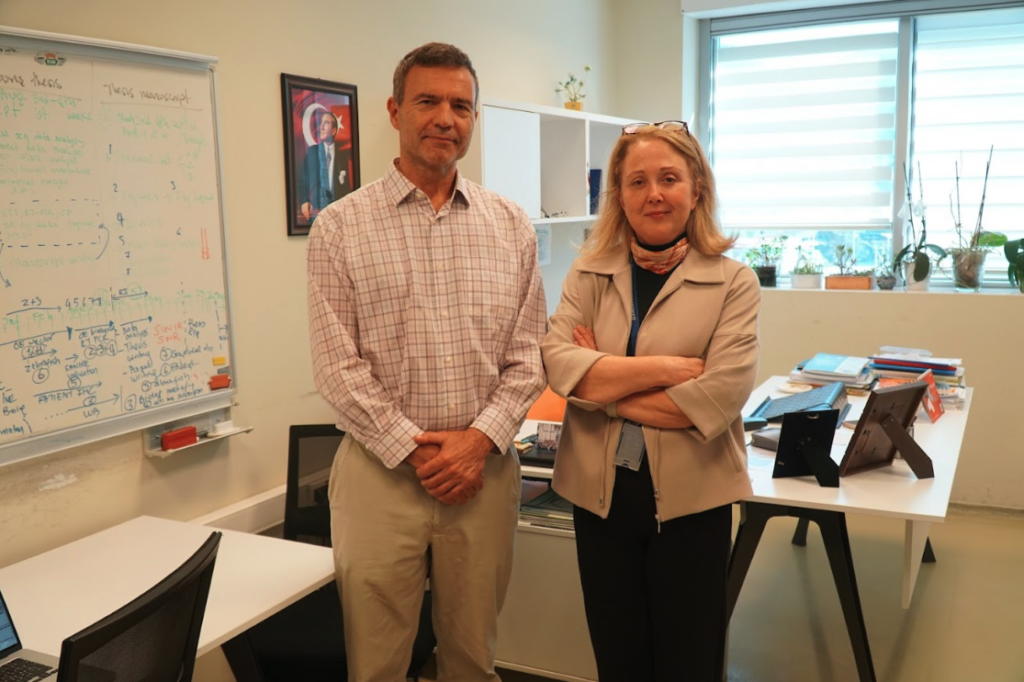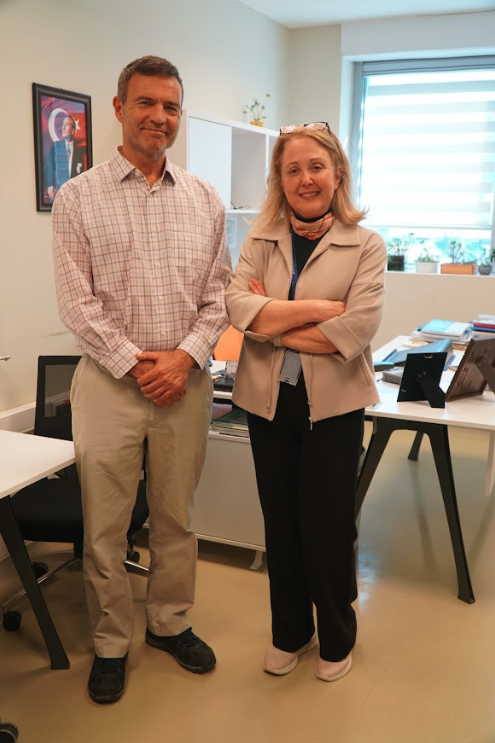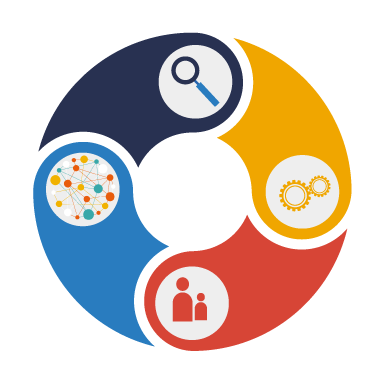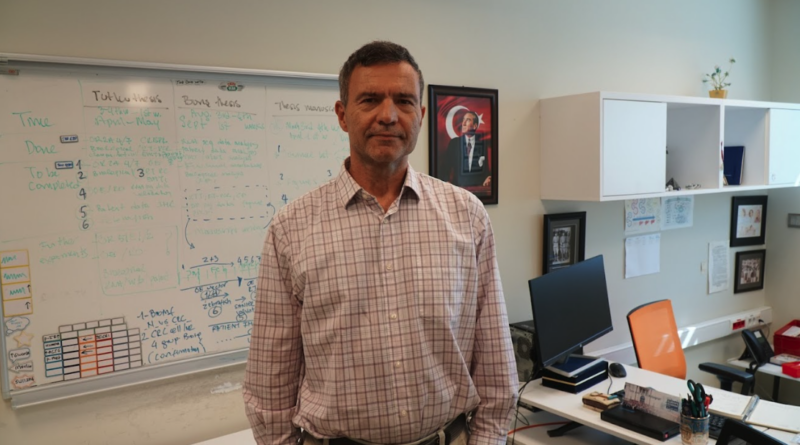A scientific bridge between İzmir and Oslo: An interview with Prof. Fahri Saatçıoğlu
Prepared by: Selma Altın
A name who has devoted his career to unraveling the molecular secrets of prostate cancer: Prof. Dr. Fahri Saatçıoğlu. Through his research at the University of Oslo, he has shed light on the depths of cancer biology — and now, he is bringing his expertise to Turkey. As a visiting scientist at the Izmir Biomedicine and Genome Center (IBG) under the TÜBİTAK 2221 Visiting Scientist Fellowship Program, he collaborates with Prof. Dr. Neşe Atabey on a joint project focusing on the stress response mechanisms of cancer cells. This research, which aims to understand how cells develop “survival strategies”, holds great promise not only for basic science but also for future clinical applications.
This collaboration began last fall during a conference in İzmir, which brought the two scientists together at the same table — combining Oslo’s experience with IBG’s strong research infrastructure and young scientific talent. The result is an exciting synergy for both Turkey and the international scientific community.
We talked with Prof. Dr. Fahri Saatçıoğlu about his scientific journey leading to IBG, his joint research on prostate and liver cancer, his views on science policy, and his reflections on Turkey.
How did your collaboration with IBG come about under the TÜBİTAK 2221 Visiting Scientist or Sabbatical Program?
Last fall, there was the Galen Days Conference in İzmir, and I was invited to speak there. During the conference, while talking with Prof. Neşe Atabey, she told me about the TÜBİTAK program. I applied and was accepted. In our system, we also have an academic sabbatical every seven to eight years, and my time had come. I had previously gone mostly to the United States, but this time I wanted to come to Turkey — both because of close friends and scientific collaborators here.
Neşe and I had already been discussing possible joint projects, so we developed a proposal together and received a positive response.

What is the focus of your joint research with Prof. Dr. Neşe Atabey? Which biological process or disease model are you studying on in this project?
Our field mainly focuses on the molecular and cellular mechanisms of prostate cancer. Last year, we published a paper on this topic.
There is a signaling pathway that determines how cells respond to stress. Just as we experience stress and develop coping mechanisms, cells do the same. They face various types of stress — metabolic changes, oxygen deprivation, nutrient shortage, or altered acid-base balance.
For example, consider a pancreatic beta cell, which produces insulin — a protein. After eating, the demand for insulin increases sharply, forcing the beta cell to quickly adapt its machinery. This creates cellular stress. To deal with it, the cell activates certain signaling pathways, especially those related to endoplasmic reticulum (ER) stress. The ER produces about one-third of all proteins in the cell, particularly those destined for membranes or secretion.
When the cell is under excessive load, these signaling pathways — collectively known as the unfolded protein response (UPR) — are activated. They help the cell survive by stopping protein synthesis, increasing protein-folding capacity, and removing misfolded proteins.
However, cancer cells exploit this mechanism for their own survival, as they constantly face stress due to rapid growth, nutrient deprivation, and hypoxia. We found that UPR activation helps prostate cancer cells survive, and when we inhibit this pathway, tumors in prostate cancer models’ regress.

Interestingly, this pathway not only affects cancer cell growth but also the tumor microenvironment, which includes immune and other supporting cells. When activated in cancer cells, UPR creates an immunosuppressive microenvironment. We discovered the mechanism behind this.
In recent years, immunotherapy has become a breakthrough approach in cancer treatment, aiming to activate the immune system against cancer. This strategy has been very successful in some cancers, such as multiple myeloma, lymphoma, and certain solid tumors, but not in others like prostate cancer, which are called “cold tumors.” “Hot” tumors have active immune responses, while “cold” ones are immunosuppressed.
Our research showed that inhibiting the UPR pathway can turn a cold tumor microenvironment into a hot one. When discussing with Prof. Atabey, we realized that UPR’s effects had not been thoroughly studied in their models, although they had observed some related markers. Using our expertise and established cell models, we formed a hypothesis and began collaborative experiments. We already see some interesting preliminary results — we’ll see how it develops.
How does this project connect with your work at the University of Oslo? Has there been synergy between the two institutions?
Our goal is to extend this collaboration into a larger-scale TÜBİTAK project with broader impact. Additionally, a new Norway–Turkey scientific cooperation program has recently started, and if our results are promising, we plan to apply to it — effectively building a scientific bridge.
Beyond that, one of my reasons for coming here was to diversify the model organisms we use in our research. We mainly use mice, which are valuable but sometimes insufficient for detailed mechanistic studies. For a long time, I’ve wanted to adapt some of our work to zebrafish models, and IBG has excellent researchers experienced in this. If we obtain positive results, we might expand this into an EU-level collaborative project.
What is the long-term scientific or clinical potential of your findings?
The project is still at an early stage. We were the first to demonstrate the importance of this pathway in prostate cancer about ten years ago. Since then, we’ve published two key papers and identified a small-molecule inhibitor of this pathway, which has completed Phase I clinical trials.
Next, we’ll investigate whether this drug is effective against other cancers such as breast or liver cancer. If our joint research at IBG confirms that UPR plays a crucial role in liver cancer as it does in prostate and breast cancers, then clinical applications could develop quickly, since a drug already exists.
For now, we’re working at the in vitro level. If those results are positive, we’ll move to in vivo experiments, and if those are successful, then clinical studies will follow.
What are your observations on Turkey’s research infrastructure and scientific environment?
In terms of research infrastructure, I believe we lack nothing. The environment at IBG is perfectly suitable for top-level research.
Secondly, we have brilliant young scientists — truly talented individuals with great potential. Many have come to our lab in Oslo; I’ve seen how well-trained they are.
What’s missing, unfortunately, is science policy — especially meritocracy. Without merit, nothing works, particularly in science, where it quickly closes all channels. Of course, the economic difficulties have an impact, but those can improve over time. What’s really needed is a long-term perspective — understanding that science yields result slowly, yet strengthens social structure, unity, and resilience.
We have excellent infrastructure and human potential, but to sustain this, the system, mindset, and merit-based science policy must be established.
It seems you’ve been turning your focus more toward Turkey. Could this lead to a return in the future?
Our hearts have always been here. Over the years, many Turkish researchers have come to our lab — some short-term, some long-term, some completing their PhDs, and others returning to establish their own labs here. So, the connection has always been active.
Closing my lab in Norway and moving here permanently isn’t possible right now — it’s a structure we’ve built gradually over many years, and it’s just beginning to bear fruit. It’s also crucial for the young researchers working there.
But Norway isn’t far — only a 3.5-hour direct flight. If our projects here yield positive results, it will naturally allow me to spend more time in Turkey and contribute even more actively.

